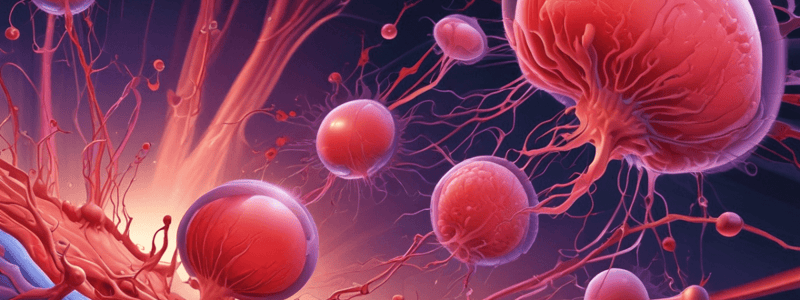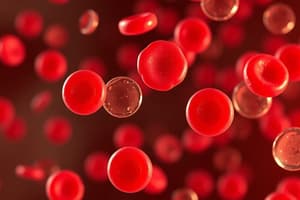Podcast
Questions and Answers
What is the initial cell type in thrombopoiesis?
What is the initial cell type in thrombopoiesis?
- Platelets
- Megakaryocytes
- CFU-Meg cells (correct)
- Megakaryoblasts
What occurs during endomitotic replication in megakaryoblasts?
What occurs during endomitotic replication in megakaryoblasts?
- Cell division
- Release of platelets into the blood
- DNA replication without division (correct)
- Formation of small cell fragments
Which of the following is NOT a key factor in thrombopoiesis?
Which of the following is NOT a key factor in thrombopoiesis?
- Erythropoietin (EPO) (correct)
- Thrombopoietin (TPO)
- GM-CSF
- IL-3
What happens if thrombopoiesis fails?
What happens if thrombopoiesis fails?
What process follows the replication of DNA in megakaryoblasts during thrombopoiesis?
What process follows the replication of DNA in megakaryoblasts during thrombopoiesis?
Which stage comes immediately after the Promyelocyte stage in the granulocyte maturation process?
Which stage comes immediately after the Promyelocyte stage in the granulocyte maturation process?
During the maturation of granulocytes, what is the stage before the Metamyelocyte?
During the maturation of granulocytes, what is the stage before the Metamyelocyte?
What is the initial stage of granulocyte maturation?
What is the initial stage of granulocyte maturation?
In the granulocyte maturation process, what is the final stage before reaching maturity?
In the granulocyte maturation process, what is the final stage before reaching maturity?
Which of the following illustrates the correct sequence in the granulocyte maturation process?
Which of the following illustrates the correct sequence in the granulocyte maturation process?
What is the ploidy range of a megakaryoblast?
What is the ploidy range of a megakaryoblast?
Which cell type has a ploidy range of 8-32n?
Which cell type has a ploidy range of 8-32n?
At what ploidy range does a megakaryocyte exist?
At what ploidy range does a megakaryocyte exist?
During which stage of thrombopoiesis does the ploidy range reach up to 64n?
During which stage of thrombopoiesis does the ploidy range reach up to 64n?
What is the initial cell type in the process of thrombopoiesis?
What is the initial cell type in the process of thrombopoiesis?
What does 'Ly' stand for in the context of bone marrow architecture?
What does 'Ly' stand for in the context of bone marrow architecture?
Which cell type is represented by 'Mega' in bone marrow architecture?
Which cell type is represented by 'Mega' in bone marrow architecture?
What stage of cell development is indicated by 'E3-E4'?
What stage of cell development is indicated by 'E3-E4'?
What is the meaning of 'Seg' in bone marrow architecture?
What is the meaning of 'Seg' in bone marrow architecture?
What does 'SC' represent in the context of bone marrow cytology?
What does 'SC' represent in the context of bone marrow cytology?
At which stage of erythropoiesis are cells described as having a large, dark purple nucleus with blue cytoplasm containing small, dark purple granules?
At which stage of erythropoiesis are cells described as having a large, dark purple nucleus with blue cytoplasm containing small, dark purple granules?
Which stage in erythropoiesis comes directly after BFU-E?
Which stage in erythropoiesis comes directly after BFU-E?
What is the distinguishing feature of polychromatic red cells (reticulocytes) in erythropoiesis?
What is the distinguishing feature of polychromatic red cells (reticulocytes) in erythropoiesis?
Which stage of erythropoiesis is characterized by the presence of many small, reddish-brown, irregularly-shaped cells with a larger, more prominent cell in the center?
Which stage of erythropoiesis is characterized by the presence of many small, reddish-brown, irregularly-shaped cells with a larger, more prominent cell in the center?
Which characteristic is shared by intermediate and late normoblasts during erythropoiesis?
Which characteristic is shared by intermediate and late normoblasts during erythropoiesis?
Which cell type is the last stage in monopoiesis?
Which cell type is the last stage in monopoiesis?
What is the first cell type in the process of monopoiesis?
What is the first cell type in the process of monopoiesis?
Which of these is an intermediate stage in monopoiesis?
Which of these is an intermediate stage in monopoiesis?
Which cell type directly precedes the immature monocyte in monopoiesis?
Which cell type directly precedes the immature monocyte in monopoiesis?
Which of these cells appears with dense, rounded nucleus in the monopoiesis process?
Which of these cells appears with dense, rounded nucleus in the monopoiesis process?
What type of cell evolves from a promonocyte?
What type of cell evolves from a promonocyte?
Which factor is associated with the development of red cells?
Which factor is associated with the development of red cells?
What type of blood cell does CFU-Meg develop into?
What type of blood cell does CFU-Meg develop into?
Which cytokine is associated with the development of basophils?
Which cytokine is associated with the development of basophils?
Which factor is involved in the lineage leading to neutrophils?
Which factor is involved in the lineage leading to neutrophils?
Which factor promotes the differentiation of monocytes?
Which factor promotes the differentiation of monocytes?
What type of blood cell does CFU-Eo develop into?
What type of blood cell does CFU-Eo develop into?
Which progenitor cell directly gives rise to Red cells?
Which progenitor cell directly gives rise to Red cells?
What is the precursor cell to Neutrophils?
What is the precursor cell to Neutrophils?
From which cell do Platelets originate?
From which cell do Platelets originate?
Which cell type does CFU-GM directly differentiate into?
Which cell type does CFU-GM directly differentiate into?
Which cell lineage comes from CFU-L?
Which cell lineage comes from CFU-L?
What is the initial cell type in erythropoiesis?
What is the initial cell type in erythropoiesis?
Which factor promotes the development of monocytes?
Which factor promotes the development of monocytes?
Which type of cell is a precursor for granulocytes and monocytes?
Which type of cell is a precursor for granulocytes and monocytes?
Which stage follows the pronormoblast in erythropoiesis?
Which stage follows the pronormoblast in erythropoiesis?
Which of the following is a characteristic feature of blasts?
Which of the following is a characteristic feature of blasts?
Which growth factors help create precursor cells for granulocytes and monocytes?
Which growth factors help create precursor cells for granulocytes and monocytes?
What do late normoblasts mature into in erythropoiesis?
What do late normoblasts mature into in erythropoiesis?
Which of the following indicates a problem in granulopoiesis?
Which of the following indicates a problem in granulopoiesis?
Where does haemopoiesis occur in the embryo?
Where does haemopoiesis occur in the embryo?
Which site is NOT a haemopoietic site in adults?
Which site is NOT a haemopoietic site in adults?
At what stage of development does the bone marrow start to function as a haemopoietic site?
At what stage of development does the bone marrow start to function as a haemopoietic site?
During which stage of development do all bones contain haemopoietic bone marrow?
During which stage of development do all bones contain haemopoietic bone marrow?
Which haemopoietic sites are present during the foetal stage?
Which haemopoietic sites are present during the foetal stage?
Flashcards are hidden until you start studying
Study Notes
Thrombopoiesis
- Thrombopoiesis is the process of making platelets.
- Starts with CFU-Meg cells, which turn into megakaryoblasts.
- Megakaryoblasts undergo endomitotic replication, becoming polyploid (having multiple sets of chromosomes).
- Nuclear lobulation occurs, where the nucleus of these cells develops multiple lobes.
- Platelets are formed from small fragments released from megakaryocytes into the blood.
- Key factors: GM-CSF, TPO (thrombopoietin), and IL-3 are essential for this process.
Granulocyte Progenitors
- Maturation stages: blast, promyelocyte, myelocyte, metamyelocyte, band form, and segmented neutrophil.
Bone Marrow Architecture
- Stromal cells, megakaryocytes, lymphocytes, and precursors of different blood cells are present in the bone marrow.
- Different stages of red cell development (E3-E4) are seen in the bone marrow.
Erythropoiesis
- Maturation stages:
- BFU-E (early red blood cell precursors)
- CFU-E (further development)
- Pronormoblasts (first recognizable red blood cell precursors)
- Early, intermediate, and late normoblasts (maturation stages)
- Reticulocytes (almost mature red blood cells)
- Red blood cells (fully functional)
- Erythropoiesis is the process of making red blood cells.
- Key factor: EPO (erythropoietin).
Haemopoiesis Sites and Drivers
- Pluripotent stem cells can develop into different types of blood cells.
- CFU-GEMM (Colony Forming Unit-Granulocyte, Erythrocyte, Monocyte, Megakaryocyte) is a precursor cell that can develop into different blood cells.
- Different colony forming units (CFU) and growth factors are involved in the development of different blood cells:
- CFU-E and EPO (erythropoietin) for red blood cells
- CFU-Meg and TPO (thrombopoietin) for platelets
- CFU-GM and GM-CSF for granulocytes and monocytes
- CFU-G and G-CSF for granulocytes
- CFU-M and M-CSF for monocytes
- CFU-Eo and IL-5 for eosinophils
- CFU-Baso and IL-3 for basophils
- CFU-L and GM-CSF for lymphocytes
Monopoiesis
- Monopoiesis is the process of making monocytes.
- Starts with CFU-GM stage.
- M-CSF (macrophage colony stimulating factor) is essential for monocyte development.
- Immature monocyte stages: monoblast, promonocyte, and immature monocyte.
Blood Cell Development
- Haemopoiesis begins with pluripotent stem cells.
- Immature cells called "blasts" have distinctive features:
- High nucleus to cytoplasm ratio
- Noticeable nucleolus
- Open chromatin
- Basophilic cytoplasm
- Blasts differentiate into different blood cell types in response to growth factors.
Disorders
- Neutropenia (lack of granulocytes) and monocytopenia (lack of monocytes) can result from problems in granulopoiesis and monopoiesis.
Haemopoietic Sites
- Haemopoietic sites vary with age:
- Embryo: yolk sac
- Foetus: liver, spleen, and bone marrow
- Infants: all bones - bone marrow
- Adults: vertebrae, ribs, sternum, skull, sacrum, pelvis, and proximal ends of femur
Studying That Suits You
Use AI to generate personalized quizzes and flashcards to suit your learning preferences.




